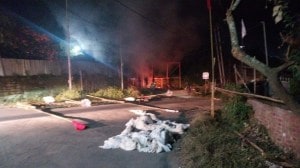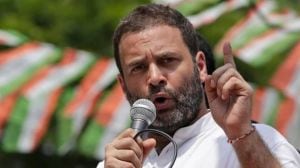The General leaves saying there is no going back
In emphasising soft borders and shared responsibilities in countering terrorism, Prime Minister Manmohan Singh and Pakistan’s President...

In emphasising soft borders and shared responsibilities in countering terrorism, Prime Minister Manmohan Singh and Pakistan’s President Pervez Musharraf decisively steered the two nations today towards a creative final settlement of the Jammu and Kashmir question.
The journey might be long and difficult. But Manmohan and Musharraf have recognised that you do not arrive if you don’t travel.
The extraordinary joint statement read out by Manmohan Singh with Musharraf standing next to him this morning has for the first time put India and Pakistan into a game in which both could come out as winners.
The joint statement, however, was not ready last night. Its important proclamation that the Indo-Pak peace process is now ‘‘irreversible’’ was nearly proven wrong as officials from the two foreign offices fought relentlessly over minor phrases.
Old habits die hard. While Singh and Musharraf were trying to inject a new vision into bilateral relations, the bureaucrats were in a negative sum game where both sides lose.
Last night, there was a replay of the old word games on terrorism and Kashmir, in terms of references to old agreements of January and September 2004.
Manmohan and Musharraf, however have had little time for these word games. They would rather address problems than find the right phrase. With this new approach they have unveiled two new concepts that could help reach the final destination in Kashmir.
|
They agree to agree
|
|||||
|
• Peace process now irreversible. Story continues below this ad |
|||||
The first is about ‘‘soft borders.’’ In deciding to increase the frequency of the Srinagar-Muzaffarabad bus service, introduce another bus service between Poonch and Rawalakot and initiate intra-Kashmiri trade across the LoC, Manmohan and Musharraf have helped shift the focus from territorial adjustments in Jammu and Kashmir to the people of the state.
The second concept is about shared responsibilities to prevent terrorism for promoting peace in Kashmir. In condemning the terrorist attacks on the Srinagar-Muzaffarabad bus service and declaring that they ‘‘would not allow terrorism to impede the peace process,’’ Manmohan and Musharraf were underlining the need for cooperation in curbing violence in Kashmir.
Together, the ideas of soft borders and shared responsibilities for peace outline the basis for cooperative institutions across the line of control in Kashmir. If developed in the coming months and years, these concepts could allow India and Pakistan to meet each other’s conditions for a settlement of the Kashmir question.
Manmohan has insisted that borders cannot be redrawn in Kashmir and that borders should not matter in the daily lives of the people. Musharraf, on his part, says the line of control cannot be the border.
Only soft borders and shared responsibilities will allow the two sides to navigate between these positions and find a way to change the political relationships all around in Jammu and Kashmir.
The two leaders also instructed their officials to expedite discussions to find ‘‘mutually acceptable solutions’’ to the Siachen and Sir Creek issues. It’s understood that Musharraf made the point during discussions that, unlike the Jammu and Kashmir issue—which is quite complex and could take time—these issues can be resolved if both sides approach it with sincerity.
The Iran-Pakistan-India gas pipeline also finds mention in the joint statement with both sides agreeing to hold a meeting of the two Petroleum Ministers in May. They will also explore other areas of cooperation in this sector.
On the economic front, the two leaders recognised their responsibility as the two major economies in South Asia and decided to reactivate the joint economic commission lying dormant since 1989 and set up a joint business council for private sector interaction.
Earlier in the day, Musharraf, in a breakfast interaction with a group of editors, said he had come to India with a ‘‘new heart’’ compared to his last visit. He noted that world has changed after 9/11 and that the time for ‘‘conflict resolution’’ has come. ‘‘We need to resolve conflicts without brushing them under the carpet.’’
The Pakistan President also sought to build the case that all killings, whether carried out by a state or mercenaries, must stop as it would not be possible to arrive at a conclusion as to who is a terrorist. ‘‘While on one side one is terrorist, on the other side he is a freedom fighter…such is the case in Palestine, Bosnia, Kosovo and Chechnya….It is a very complicated issue.’’
On the Kashmir issue, Musharraf ruled out any military option to resolve the problem and emphasised the need for an ‘‘out-of-the-box’’ solution without stipulating any ‘‘rigid timeframe’’.
He felt that both sides need to look at Kashmir in a wider context that would include issues like independence, self-governance, autonomy, joint control and joint management for a step-by-step solution that would be acceptable to India, Pakistan and the people of Kashmir. Musharraf underlined that the responsibility to initiate this debate was with the top leadership which needs to realise that the issue could ‘‘erupt’’ in the future under a ‘‘different leadership and a different environment’’ if it doesn’t get adequate attention now. ‘‘I think the outcome has been better than I expected,” Musharraf said.
|
His words of wisdom to Geelani: get real
|
||||
|
Musharraf tells the Pakistani media that Kashmiri separatist s must consider India’s offer for talks: Story continues below this ad • Bus popular, why must Geelani oppose • J&K: Rights yes, but militant attacks • Soft border will facilitate solution • Kargil hero kneels before India: Militants |
||||
Photos




- 01
- 02
- 03
- 04
- 05



























